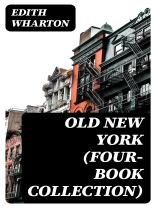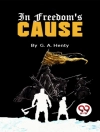In ‘Old New York, ‘ Edith Wharton presents a captivating four-book collection that intricately explores the social mores and distinctive cultural landscape of late 19th-century New York City. Through rich, atmospheric prose and keen psychological insight, Wharton delves into the lives of its upper-class society, revealing the intricate dance between propriety, ambition, and moral complexity. The collection intertwines narratives of love, betrayal, and the often-punitive nature of social expectations, bringing to life a milieu where elegance and decay coexist, and where characters grapple with the weight of tradition against the surge of modernity. Edith Wharton, an American novelist and leading figure of the literary elite, draws upon her own experiences as a member of the elite society she depicts. Her deep understanding of the cultural intricacies and tensions within high society, combined with her personal observations, fuels her narratives. Wharton’s background and vantage point provide her with the unique ability to both celebrate and critique the world she inhabited, allowing for a nuanced portrayal of its constraints and complexities. ‘Old New York’ is an essential read for those interested in American literature and social history. Wharton’s astute observations and masterful storytelling not only illuminate the past but also resonate with contemporary themes of identity and societal pressure. This collection invites readers to reflect on the enduring impacts of class and culture, making it a pivotal addition to any literary canon.
A propos de l’auteur
Edith Wharton, born Edith Newbold Jones on January 24, 1862, into a wealthy New York family, was an American novelist, short story writer, and designer who provided keen insight into the upper-class society into which she was born. Aptly mirrored in her nuanced depictions of the Old New York of the late 19th century, Wharton’s writing was characterized by her wry wit and astutely crafted narratives. Her heritage echoed the saying ‘keeping up with the Joneses, ‘ encapsulating the affluence and social prominence expected of her. She shattered the confines of her era’s expectations for women by becoming a successful author, receiving the Pulitzer Prize for her novel ‘The Age of Innocence’ in 1921, making her the first woman to win the award. Wharton’s oeuvre includes a comprehensive four-book collection titled ‘Old New York, ‘ exploring the intricacies and moral conflicts of social stratification and personal freedom within her familiar milieu of New York City during the 1840s to the 1870s. Each novella within the collection — ‘False Dawn, ‘ ‘The Old Maid, ‘ ‘The Spark, ‘ and ‘New Year’s Day’ — illuminates aspects of the human condition through the lens of the city’s elite. A proponent of literary realism and naturalism, her writing demonstrates a profound understanding of both individual character and broader societal norms. Wharton passed away on August 11, 1937, but her literary legacy continues to illuminate the mores of American society during a transformative era in history.












